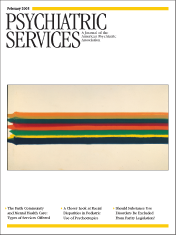The Faith Community and Mental Health Care
From shamanism, ritual dances, and exorcism to modern pastoral counseling, efforts to deal with mental illness have been in the domain of religious practice throughout cultural history. Now that the demons of mental disorders have been substantially tamed by scientific approaches, people with mental illness in medically advanced cultures are likely to seek relief from a physician or mental health professional. However, many will turn first to clergy or a faith-based agency.
Although the movement to fund faith-based agencies with federal monies raises concerns about eroding the constitutional separation of church and state, faith-based agencies serve a significant part of the population. Churches, synagogues, and mosques serve as surrogate families and community centers for millions of people. Religious writings and spiritual practices bring solace, support, sharing, practical wisdom, and guidance for dealing with myriad challenges, relationships, transitions, and losses. People with incipient mental illness may trust religious organizations far more than community health services.
This issue of Psychiatric Services reports the results of two surveys of leaders in the faith community that sought to examine attitudes about mental illness and the types of care that congregants might expect to receive when they seek help within the faith community. Ali and colleagues surveyed the imams of 62 mosques across the country, and Dosset and coauthors surveyed 42 faith-based organizations—churches, schools, and nonprofit agencies—in Los Angeles. Both surveys found that although many congregants received individual or marital counseling within their religious organizations, relatively few of the counselors had formal training. Interestingly, in view of the concerns about the separation of church and state, half of the Los Angeles agencies were reluctant to collaborate with government agencies. Evidently the wariness is bilateral. However, because a large part of the care for severe mental illness occurs in governmental agencies, this attitude could impede access to treatment. A case could be made for faith-based agencies' having consultative arrangements with mental health facilities, rather than faith-based agencies' attempting to provide full-scale care for patients with serious mental illness.
Fundamental incompatibilities exist between faith-based interventions, such as faith healing or exorcism, and a medical model of treating mental illness. Religious leaders and mental health professionals who conduct psychotherapy may differ markedly about basic concepts of psychological health and mental illness. These differences can yield to mutual respect, case-based consultation, education, and exchange of ideas between clergy and mental health professionals, to the benefit of those with mental disorders.



